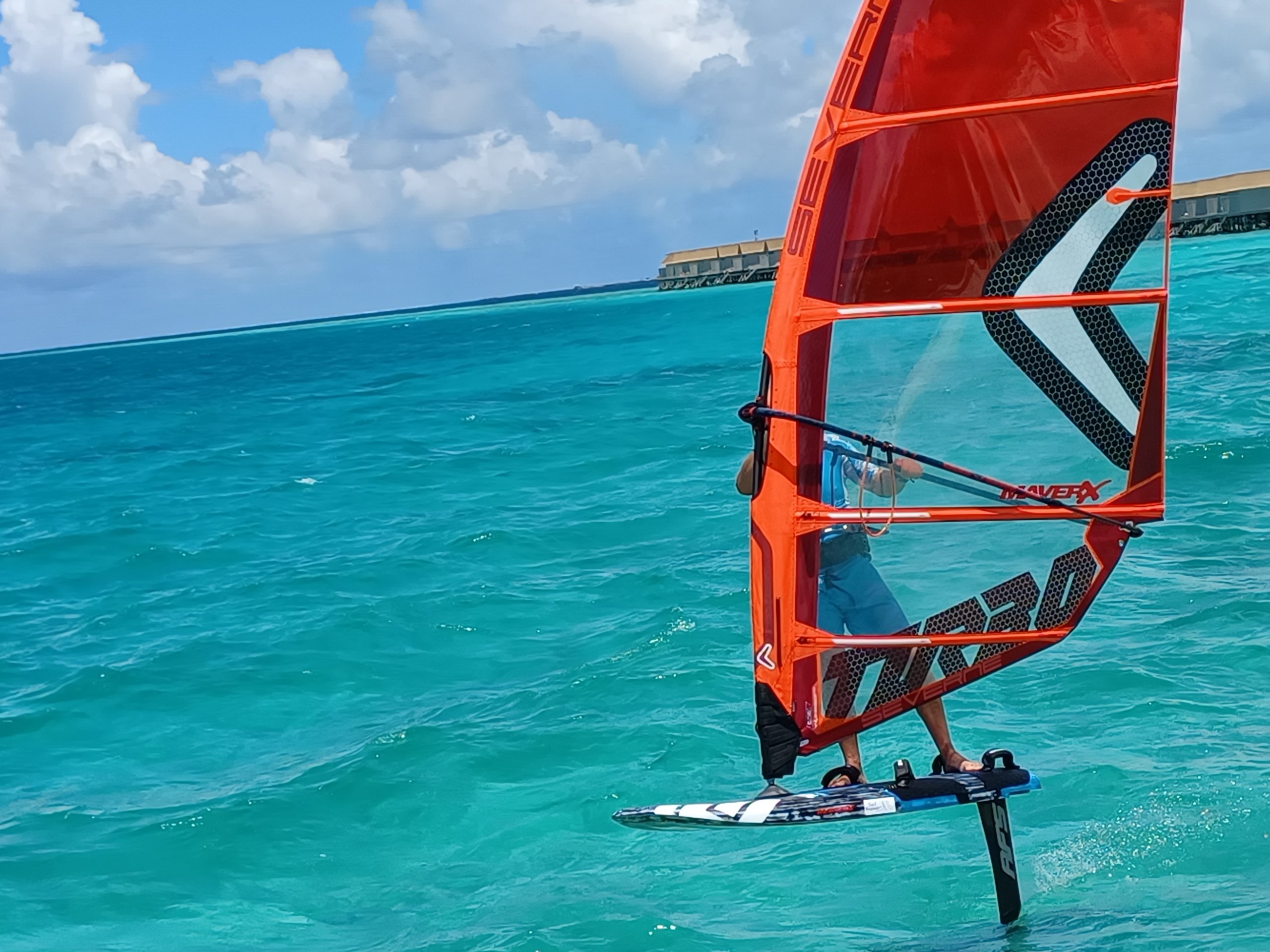
AFS 2022 Windfoils
I have been on AFS foils for many years starting with the AFS2 which then became the Wind range, W85, W95 and W105. They all had the cigar shaped fuselage which from memory was 88cm long. The “W” range was then updated with longer 94.5cm rectangular fuselages and a moulded in collar at the tuttle head. And now we have another development in the new 105cm fuselage. Here I will give my thoughts on the progression. This is not a finished article as I am still testing combinations and set ups and I will update this blog in due course.
I should state that I don’t race so my findings relate to comparisons with previous AFS foils and the occasions when foiling with other sailors. One of the things I have always liked about AFS foils has been their “plug & play” nature. There was never any need to shim things, you could choose what wing size you needed, put your foil together and go sailing. Those days are now passed and you now need to do some trimming.
There are now basically two stabilizer (rear) wings and they have been designed to work on the 94.5cm fuse. So if you are using a W95 with the 94.5cm fuse you can just bolt on the stab without any shimming and go sailing. But when you put them on the 105 fuse they require a bit of negative shimming. The foils come with a couple of AFS shims which are just like flakes of carbonfiber. I have ended up putting both under the rear screw of the stab. I am not sure what angle difference that relates to in degrees. But I have since bought a shim kit from https://www.ap3dcustom.com/products/ and I tried to translate the two AFS shims to the AP3 shim which I think is about -0.5’ and I have now moved onto the -0.4’ shim with the 200 stab. Sorry if this all sounds a bit complex compared to the “fit and forget” AFS foils from the past so let me continue in more of a review style.
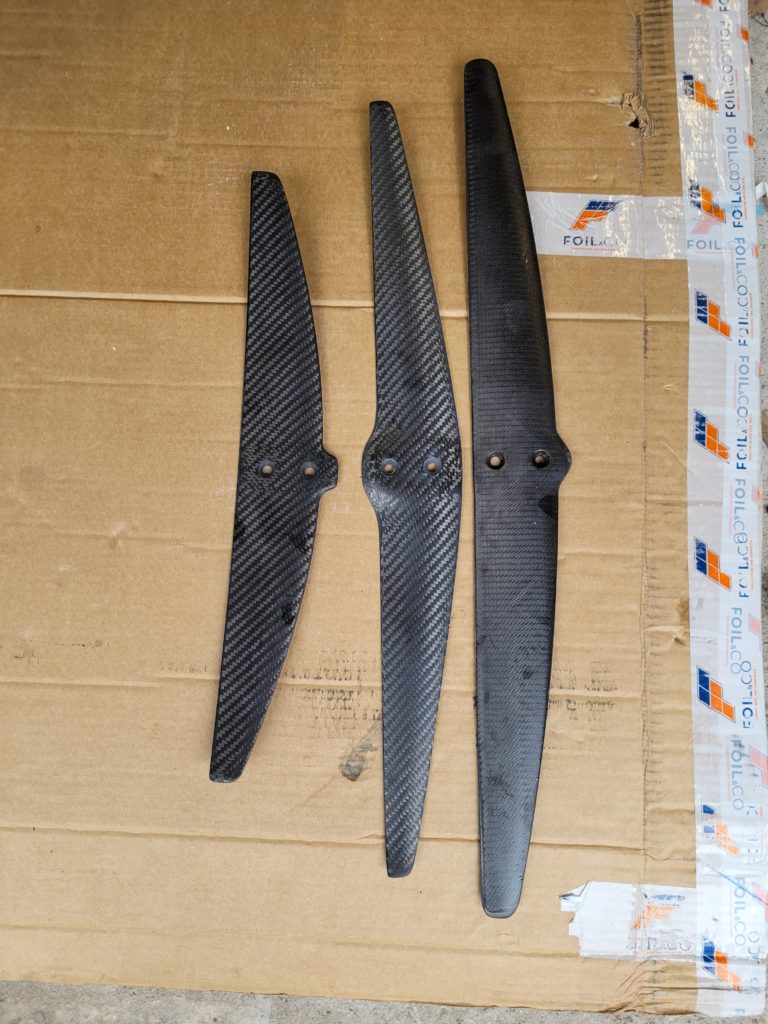
I got a W95 with a dismountable fuse and a W100 (new 100 mast height) with the new fixed 105 fuse. I have had them a while and used them a lot. To go with the new T bars I have 900, 700 and 560 front wings and 240 and 200 stabs. I also have a cut down V3 stab.
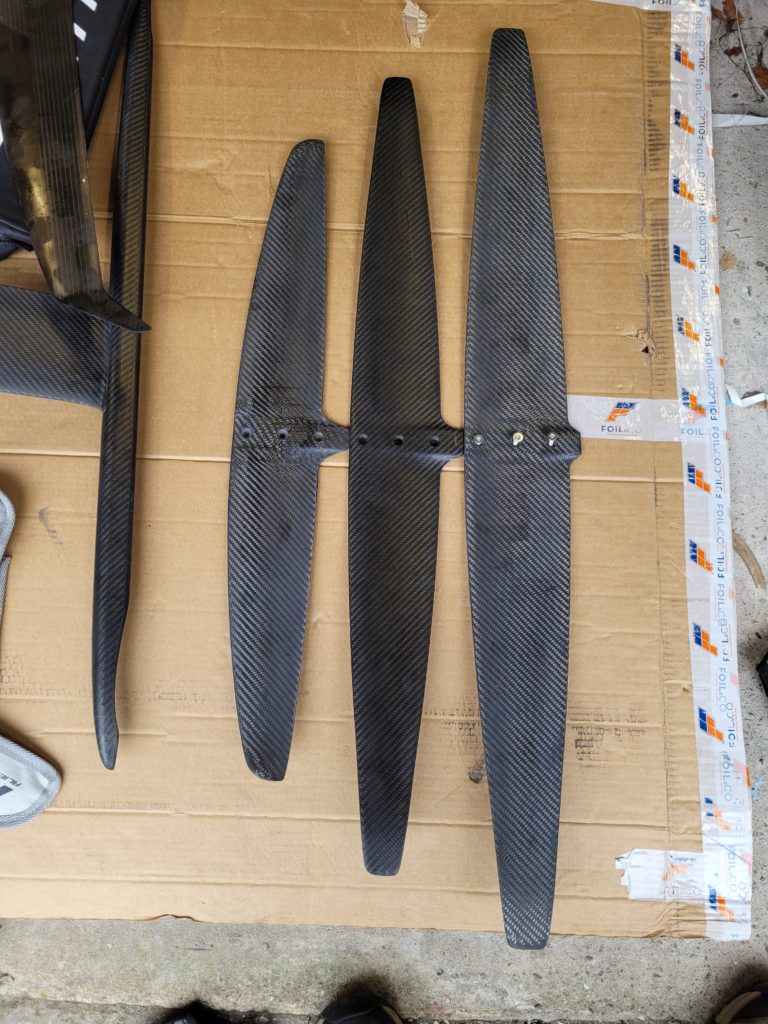
When I got the new foils it was windy and I used the W100 with the 700 wing and 240 stab (unshimmed) and I was amazed at the amount of lift provided. It felt like it had a similar range to my old R810 wing on the 94.5cm fuse. I am heavy at 95kg and in the past with the 700 wing I had to come out of gybes fast to remain flying and I needed more wind to get flying. But with the extra leverage of the 105 fuse the 700 wing flew much earlier and had more glide. Not quite as early as the R810 but close. Also when you run out of power the R810 tended to just glide down to a stop where as with the smaller 700 wing it tends to be a bit more of an abrupt drop (and the 560 even more so). Anyway those first few sessions felt great but with hindsight probably the 240 stab was doing too much work and I think I would have run into control issues as the speed increased.
Finally a day came when I could try the 900 wing with the 240 fuse. I was really looking forward to seeing how early it would fly. It was a patchy 3 to 8 kts so I had to wait for the gusts to get flying and then see how long I could stay in the air for. I would not like to put a number on what wind speed I could get flying in but it was the lightest I had flown in. So after what felt like a successful session I headed in and a slightly stronger guse came but probably only 10 kts. The foil accelerated and accelerated and the height came up and up regardless of my efforts to pin it down until the inevitable crash happened. I have never had that happen in such light winds before. That experience prompted a chat with Kevin Ellway the AFS foil designer and he advised sticking with the 200 stab on the 105 fuse. So I tried the 900/200 wings and it worked well but at times it felt like I was getting “weed strikes” – strange “slooshing” and “glugging” sounds and sensations. A further conversation with Kevin and he said I needed to add a negative shim to the stab to reduce its angle. I have done that and have had no further issues when using the 900, 700 and 560 front wings.
The new longer fuse certainly increases the lift from the foil. It lets you use a smaller (faster) wing in the same conditions. So by comparison the 700 wing on the 105 fuse is very similar to the 900 wing on the 94.5 fuse and likewise the 560 wing on the 105 fuse is similar to the 700 wing on the 94.5 fuse. When I say similar I mean in broad terms of wind/flight range. The fizzle out when the wind drops is a bit different in that the smaller wings slow down then just drop whereas the larger wing will keep going a bit more.
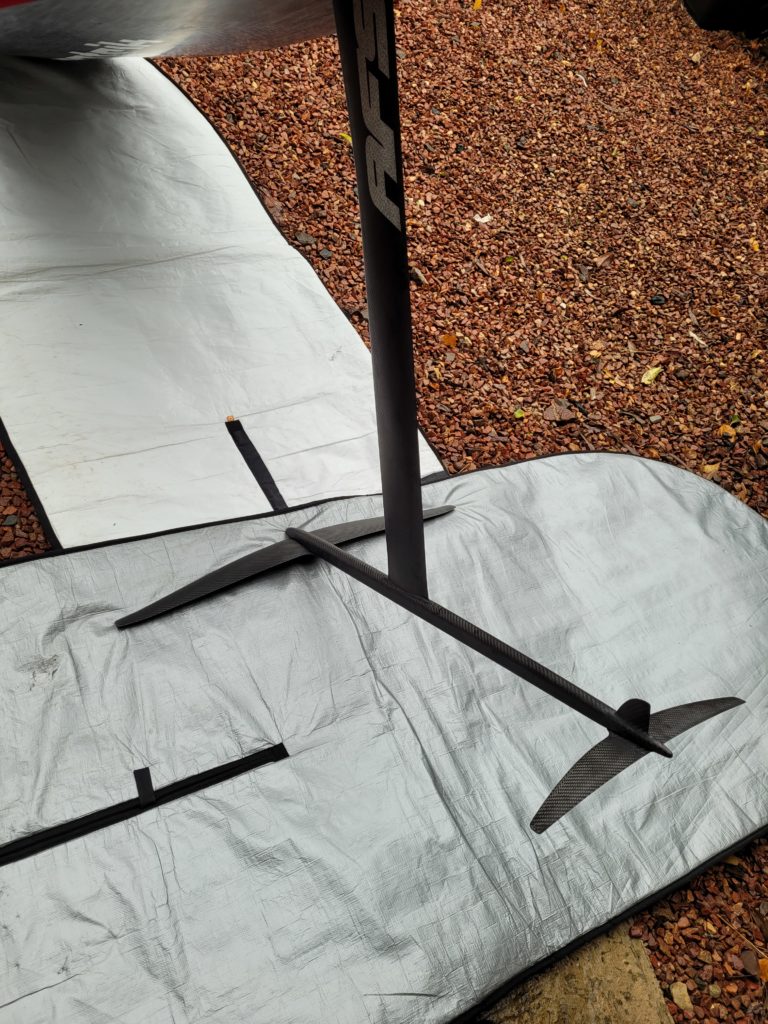
The same stiffness of previous foils remains. The new 105 fuse has a small tail stabilizer on it. You do need to be aware of it if you are in the habit of resting your feet on the fuse when waiting to waterstart as it is quite sharp and could easily cut you foot.
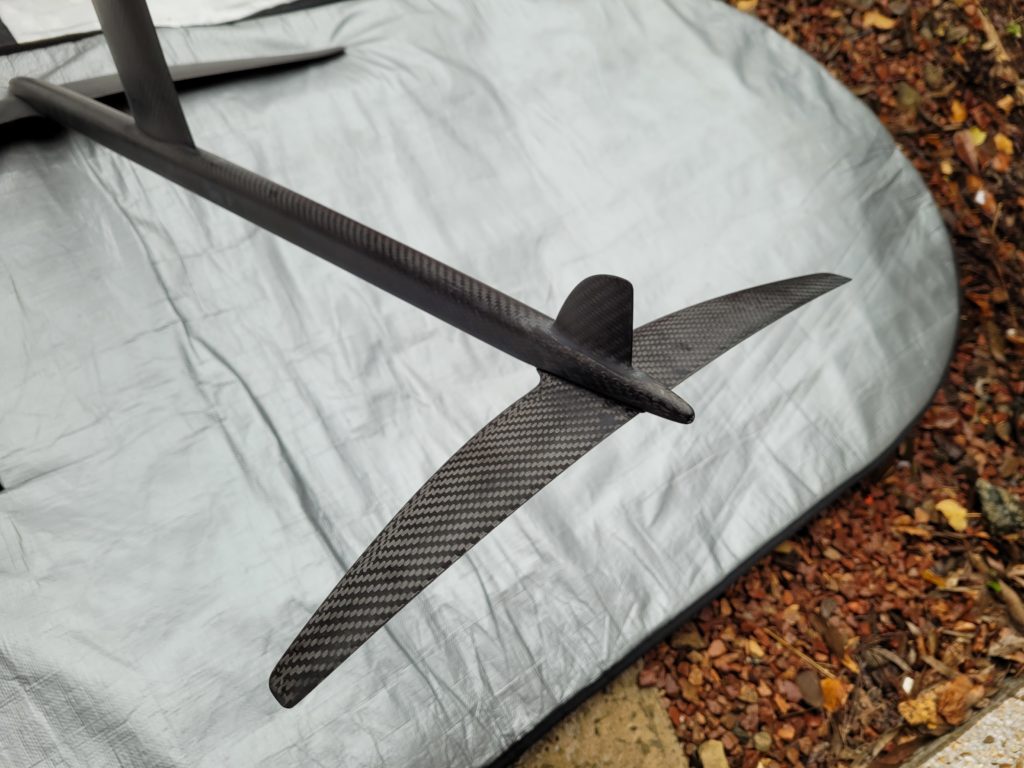
The dismountable fuselage option on the W95 seems robust. I have been told that the fixed fuse version is going to be the standard and that the dismountable version can be pre ordered. I wanted the dismountable version for air travel. I believe that AFS is now the only fully carbon windfoil on the market which for someone like me who likes to keep his foil bolted together all the time is an important feature.
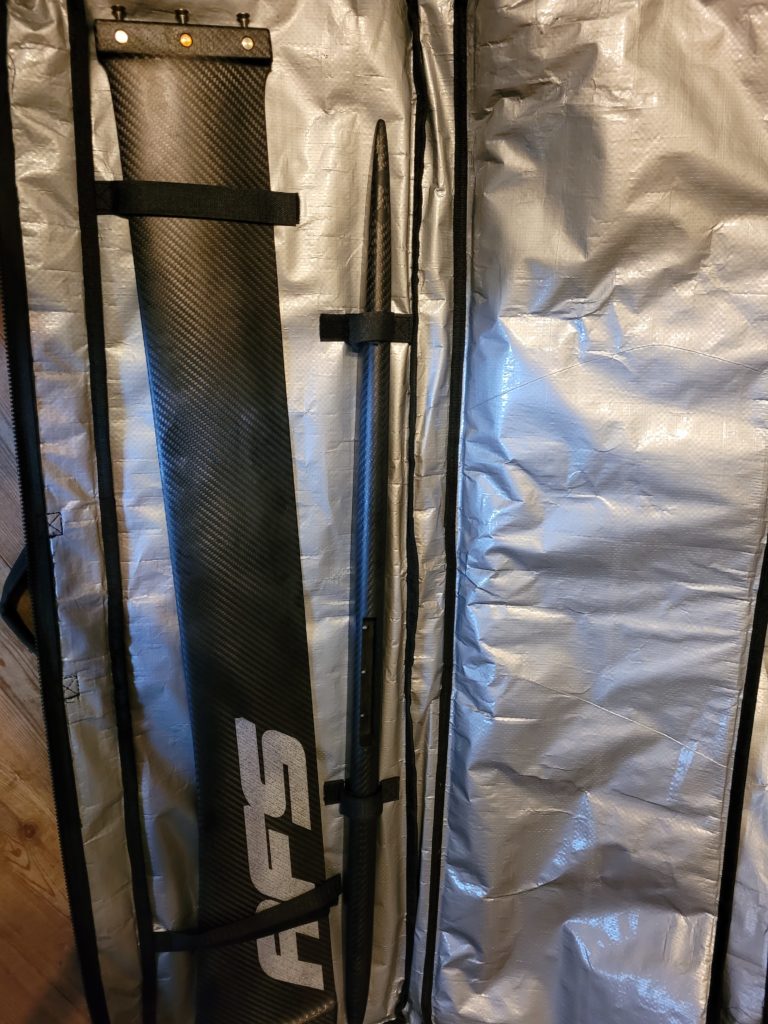
Here is a video of the W95 with the 900 wing in 9 to 13 kts – https://youtu.be/6uWdSjy1lmU
UPDATE
I have used the foils a lot now and a few things have come to light.
The W100 with the 200 rear wing does benefit from adding a negative shim on the stabilizer. I have found that a -0.5′ shim tends to give the foil more stability across a wide range of use. Without it the lift ramps up a bit too quickly as you go faster.
